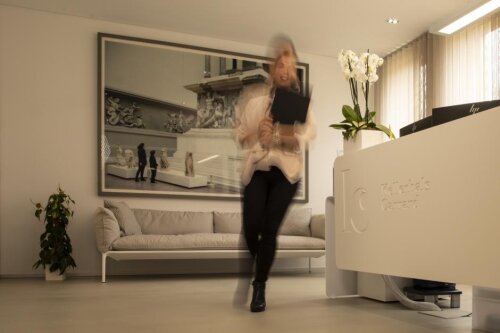Best Landlord & Tenant Lawyers in Sion
Share your needs with us, get contacted by law firms.
Free. Takes 2 min.
Free Guide to Hiring a Real Estate Lawyer
List of the best lawyers in Sion, Switzerland
About Landlord & Tenant Law in Sion, Switzerland
The city of Sion, located in the canton of Valais, follows Swiss federal regulations for landlord and tenant relationships, supplemented by cantonal and local rules. Landlord & Tenant law governs the rental of residential and commercial properties, outlining the rights and responsibilities of both parties. The law aims to ensure fair treatment of tenants while protecting landlords' property rights. Disputes can often be resolved through negotiation but may require formal mediation or legal intervention.
Why You May Need a Lawyer
There are several situations where consulting a lawyer is advisable in landlord and tenant matters in Sion. Common scenarios include eviction proceedings, disputes over rent increases, property damage claims, disagreements about lease termination, and unresolved security deposit issues. If you are not familiar with legal procedures or local regulations, a lawyer can provide expert guidance, help draft or review rental agreements, represent you in mediation or court, and ensure that your rights are protected throughout the process.
Local Laws Overview
Landlord & Tenant relations in Sion are primarily regulated by the Swiss Code of Obligations, along with cantonal and municipal supplements. Key aspects include:
- Rental agreements can be verbal or written, but written contracts are recommended.
- Tenants have strong legal protections against unfair eviction and unjustified rent increases.
- Landlords must provide proper notice before terminating a lease, typically adhering to Swiss statutory notice periods unless otherwise specified in the contract.
- Security deposits are allowed but are usually limited to three months' rent and must be held in a dedicated bank account.
- Repairs and maintenance are generally the landlord’s responsibility, while tenants must take care of minor maintenance.
- Disputes may be brought before the conciliation authority in Sion before resorting to court proceedings.
Frequently Asked Questions
What information should be included in a rental agreement?
A rental agreement should specify the identities of the parties, the property description, rental amount, payment terms, duration of the lease, notice period, responsibilities for repairs, and any special terms. While verbal agreements are allowed, written contracts can help avoid misunderstandings.
Can a landlord increase the rent at any time?
Rent increases are strictly regulated. The landlord must provide written notice and use an official form. Tenants have the right to contest an increase through the local conciliation authority if they believe it is unjustified.
What are the notice periods for terminating a lease?
Standard notice periods are set by law or by the contract. For residential leases, the notice period is typically three months, and for commercial leases, six months. Notice must be given in writing.
What is a security deposit and how is it handled?
A security deposit, usually up to three months' rent, is held in a bank account in the tenant’s name. It can only be used to cover unpaid rent or damages beyond normal wear and tear at the end of the tenancy.
Who is responsible for maintenance and repairs?
Major repairs are the landlord’s responsibility, while tenants handle minor repairs (up to a threshold defined in the lease or by local custom). Disputes over repair obligations can be brought before the conciliation authority.
How can evictions be carried out?
Evictions require following legal procedures, including official notice periods and valid reasons. Unlawful evictions are prohibited, and tenants can challenge an eviction notice before the conciliation authority in Sion.
What happens if the tenant does not pay rent?
If rent is unpaid, the landlord must give the tenant a written warning granting a grace period (usually 30 days for residential leases). If payment is not made, termination can proceed according to legal timelines.
How can rent disputes be resolved?
Most disputes are first handled by the local conciliation authority, which aims to find an amicable solution. If unresolved, the matter can proceed to the civil court in Sion.
Are sublets allowed?
Subletting is allowed if the landlord consents and the terms are reasonable. The landlord can only refuse permission under limited circumstances, such as if it causes disadvantage.
What should I do if there is damage to the property?
Report any damage to the landlord promptly. At the end of the tenancy, a formal inspection is typically conducted. Deductions from the deposit may be made for damages beyond normal wear and tear.
Additional Resources
- Conciliation Authority for Rental Matters (Autorité de conciliation en matière de baux et loyers) in Sion: First point of contact for landlord and tenant disputes. - Office for Housing of the Canton of Valais (Office du logement): Provides information on housing regulations. - Tenants’ Association (Mieterverband or ASLOCA): Offers legal support and advice to tenants. - Swiss Bar Association (Fédération Suisse des Avocats): For referrals to legal professionals specializing in landlords and tenants law.
Next Steps
If you need legal assistance regarding a landlord and tenant matter in Sion, start by gathering all relevant documents, such as rental contracts and correspondence. Contact the conciliation authority for advice or to initiate mediation. If your issue is complex or you face legal proceedings, consult a qualified lawyer with experience in Swiss landlord and tenant law. Consider also reaching out to tenant associations or housing offices for guidance on your specific situation.
Lawzana helps you find the best lawyers and law firms in Sion through a curated and pre-screened list of qualified legal professionals. Our platform offers rankings and detailed profiles of attorneys and law firms, allowing you to compare based on practice areas, including Landlord & Tenant, experience, and client feedback.
Each profile includes a description of the firm's areas of practice, client reviews, team members and partners, year of establishment, spoken languages, office locations, contact information, social media presence, and any published articles or resources. Most firms on our platform speak English and are experienced in both local and international legal matters.
Get a quote from top-rated law firms in Sion, Switzerland — quickly, securely, and without unnecessary hassle.
Disclaimer:
The information provided on this page is for general informational purposes only and does not constitute legal advice. While we strive to ensure the accuracy and relevance of the content, legal information may change over time, and interpretations of the law can vary. You should always consult with a qualified legal professional for advice specific to your situation.
We disclaim all liability for actions taken or not taken based on the content of this page. If you believe any information is incorrect or outdated, please contact us, and we will review and update it where appropriate.











